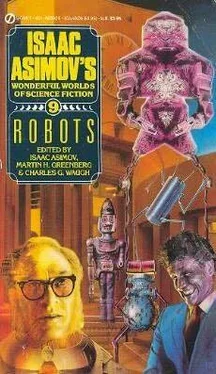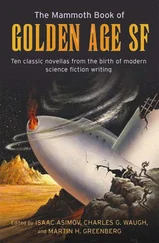Frederik Pohl - Isaac Asimov's Worlds of Science Fiction. Book 9 - Robots
Здесь есть возможность читать онлайн «Frederik Pohl - Isaac Asimov's Worlds of Science Fiction. Book 9 - Robots» весь текст электронной книги совершенно бесплатно (целиком полную версию без сокращений). В некоторых случаях можно слушать аудио, скачать через торрент в формате fb2 и присутствует краткое содержание. Год выпуска: 1989, ISBN: 1989, Издательство: Robinson Publishing, Жанр: Фантастика и фэнтези, на английском языке. Описание произведения, (предисловие) а так же отзывы посетителей доступны на портале библиотеки ЛибКат.
- Название:Isaac Asimov's Worlds of Science Fiction. Book 9: Robots
- Автор:
- Издательство:Robinson Publishing
- Жанр:
- Год:1989
- ISBN:ISBN: 1-85487-041-6
- Рейтинг книги:4 / 5. Голосов: 1
-
Избранное:Добавить в избранное
- Отзывы:
-
Ваша оценка:
- 80
- 1
- 2
- 3
- 4
- 5
Isaac Asimov's Worlds of Science Fiction. Book 9: Robots: краткое содержание, описание и аннотация
Предлагаем к чтению аннотацию, описание, краткое содержание или предисловие (зависит от того, что написал сам автор книги «Isaac Asimov's Worlds of Science Fiction. Book 9: Robots»). Если вы не нашли необходимую информацию о книге — напишите в комментариях, мы постараемся отыскать её.
Isaac Asimov's Worlds of Science Fiction. Book 9: Robots — читать онлайн бесплатно полную книгу (весь текст) целиком
Ниже представлен текст книги, разбитый по страницам. Система сохранения места последней прочитанной страницы, позволяет с удобством читать онлайн бесплатно книгу «Isaac Asimov's Worlds of Science Fiction. Book 9: Robots», без необходимости каждый раз заново искать на чём Вы остановились. Поставьте закладку, и сможете в любой момент перейти на страницу, на которой закончили чтение.
Интервал:
Закладка:
He was startled by a cry behind his back. A uniformed museum guard was pointing at him.
"This is the man!" the guard shouted. "When I opened the door this man forced his way out and ran like the devil!"
The police officers converged on Cliff.
"Who are you? What is all this?" one of them asked him roughly.
"I'm Cliff Sutherland, picture reporter," Cliff answered calmly. "And I was the one who was inside here and ran away, as the guard says."
"What were you doing?" the officer asked, eyeing him. "And where did these bodies come from?"
"Gentlemen, I'd tell you gladly-only business first," Cliff answered. "There's been some fantastic goings-on in this room, and I saw them and have the story, but"-he smiled-"I must decline to answer without advice of counsel until I've sold my story to one of the news syndicates. You know how it is. If you'd allow me the use of the radio in your plane-just for a moment, gentlemen-you'll have the whole story right afterward-say in half an hour, when the television men broadcast it. Meanwhile, believe me, there's nothing for you to do, and there'll be no loss by the delay."
The officer who had asked the questions, blinked, and one of the others, quicker to react and certainly not a gentleman, stepped toward Cliff with clenched fists. Cliff disarmed him by handing him his press credentials. He glanced at them rapidly and put them in his pocket.
By now half a hundred people were there, and among them were two members of a syndicate crew whom he knew, arrived by copter. The police growled, but they let him whisper in their ears and then go out under escort to the crew's plane. There, by radio, in five minutes, Cliff made a deal which would bring him more money than he had ever before earned in a year. After that he turned over all his pictures and negatives to the crew and gave them the story, and they lost not one second in spinning back to their office with the flash.
More and more people arrived, and the police cleared the building. Ten minutes later a big crew of radio and television men forced their way in, sent there by the syndicate with which he had dealt. And then a few minutes later, under the glaring lights set up by the operators and standing close by the ship and not far from Gnut-he refused to stand underneath him-Cliff gave his story to the cameras and microphones, which in a fraction of a second shot it to every corner of the solar system.
Immediately afterward the police took him to jail. On general principles and because they were pretty blooming mad.
5
Cliff stayed in jail all that night-until eight o'clock the next morning, when the syndicate finally succeeded in digging up a lawyer and got him out. And then, when at last he was leaving, a Federal man caught him by the wrist.
"You're wanted for further questioning over at the Continental Bureau of Investigation," the agent told him. Cliff went along willingly.
Fully thirty-five high-ranking Federal officials and "big names" were waiting for him in an imposing conference room-one of the president's secretaries, the undersecretary of state, the underminister of defense, scientists, a colonel, executives, department heads, and ranking "C" men. Old gray-mustached Sanders, chief of the CHI, was presiding.
They made him tell his story all over again, and then, in parts, all over once more-not because they did not believe him, but because they kept hoping to elicit some fact which would cast significant light on the mystery of Gnut's behavior and the happenings of the last three nights. Patiently, Cliff racked his brains for every detail.
Chief Sanders asked most of the questions. After more than an hour, when Cliff thought they had finished, Sanders asked him several more, all involving his personal opinions of what had transpired.
"Do you think Gnut was deranged in any way by the acids, rays, heat, and so forth applied to him by the scientists?"
"I saw no evidence of it."
"Do you think he can see?"
"I'm sure he can see, or else has other powers which are equivalent."
"Do you think he can hear?"
"Yes, sir. That time when I whispered to him that Stillwell was dead, he bent lower, as if to see for himself. I would not be surprised if he also understood what I said."
"At no time did he speak, except those sounds he made to open the ship?"
"Not one word, in English or any other language. Not one sound with his mouth."
"In your opinion, has his strength been impaired in any way by our treatment?" asked one of the scientists.
"I have told you how easily he handled the gorilla. He attacked the animal and threw it back, after which it retreated all the way down the building, afraid of him."
"How would you explain the fact that our autopsies disclosed no mortal wound, no cause of death, in any of the bodies-gorilla, mockingbird, or the two identical Stillwells?"-this from a medical officer.
"I can't."
"You think Gnut is dangerous?"-from Sanders.
"Potentially very dangerous."
"Yet you say you have the feeling he is not hostile."
"To me, I meant. I do have that feeling, and I'm afraid that I can't give any good reason for it, except the way he spared me twice when he had me in his power. I think maybe the gentle way he handled the bodies had something to do with it, and maybe the sad, thoughtful look I twice caught on his face."
"Would you risk staying in the building alone another night?"
"Not for anything." There were smiles.
"Did you get any pictures of what happened last night?"
"No, sir." Cliff, with an effort, held on to his composure, but he was swept by a wave of shame. A man hitherto silent rescued him my saying:
"A while ago you used the word 'purposive' in connection with Gnut's actions. Can you explain that a little?"
"Yes, that was one of the things that struck me: Gnut never seems to waste a motion. He can move with surprising speed when he wants to; I saw that when he attacked the gorilla; but most other times he walks around as if methodically completing some simple task. And that reminds me of a peculiar thing: at times he gets into one position, any position, maybe half bent over, and stays there for minutes at a time. It's as if his scale of time values were eccentric, compared to ours; some things he does surprisingly fast, and others surprisingly slowly. This might account for his long periods of immobility."
"That's very interesting," said one of the scientists. "How would you account for the fact that he recently moves only at night?"
"I think he's doing something he wants no one to see, and the night is the only time he is alone."
"But he went ahead even after finding you there."
"I know. But I have no other explanation, unless he considered me harmless or unable to stop him-which was certainly the case."
"Before you arrived, we were considering encasing him in a large block of glasstex. Do you think he would permit it?"
"I don't know. Probably he would; he stood for the acids and rays and heat. But it had better be done in the daytime; night seems to be the time he moves."
"But he moved in the daytime when he emerged from the traveler with Klaatu."
"I know."
That seemed to be all they could think of to ask him. Sanders slapped his hand on the table.
"Well, I guess that's all, Mr. Sutherland," he said. "Thank you for your help, and let me congratulate you for a very foolish, stubborn, brave young man-young businessman." He smiled very faintly. "You are free to go now, but it may be that I'll have to call you back later. We'll see."
"May I remain while you decide about that glasstex?" Cliff asked. "As long as I'm here I'd like to have the tip."
"The decision has already been made-the tip's yours. The pouring will be started at once."
Читать дальшеИнтервал:
Закладка:
Похожие книги на «Isaac Asimov's Worlds of Science Fiction. Book 9: Robots»
Представляем Вашему вниманию похожие книги на «Isaac Asimov's Worlds of Science Fiction. Book 9: Robots» списком для выбора. Мы отобрали схожую по названию и смыслу литературу в надежде предоставить читателям больше вариантов отыскать новые, интересные, ещё непрочитанные произведения.
Обсуждение, отзывы о книге «Isaac Asimov's Worlds of Science Fiction. Book 9: Robots» и просто собственные мнения читателей. Оставьте ваши комментарии, напишите, что Вы думаете о произведении, его смысле или главных героях. Укажите что конкретно понравилось, а что нет, и почему Вы так считаете.









